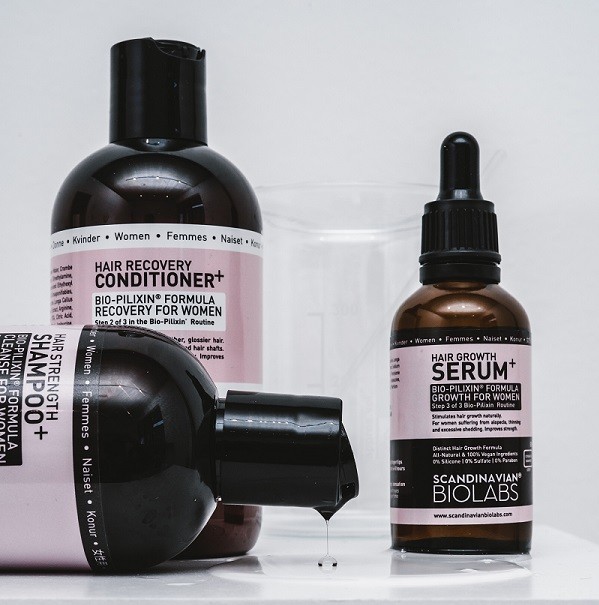By Hermoine Macura-Noble
Special to The Times Kuwait
Hair loss is a significant issue in Gulf countries, where the hot arid climate along with the harsh treated water, and even stress all combine to take a heavy toll on the crown of most people. While hair loss can be unavoidable for some due to genetics, others can combat losing their hair by taking a few simple steps to prevent it.
British pop star Robbie Williams, 48, recently announced he is going through a period of hair loss. Robbie has tried various treatments, including undergoing a hair transplant in 2013. Seven years later, the Take That singer attempted to get another transplant, but the doctors said his hair was too thin for the procedure.
Vera Clinic’s Hair Transplant Expert, Gökhan Vayni, explains more about hair thinning and the solutions available. “We all have different types of hair, with some more prone to conditions relating to hair loss than others. While others have thick hair with plenty of regrowth, others like Robbie may discover balding patches visible from thinning hair. Depending on the severity of your hair thinning, further treatment may be needed to help resolve any patches of hair loss or baldness.”
Experts say there are several ways to promote hair growth when you are sleeping, such as never sleeping with wet hair — as your hair is at its most vulnerable when it is wet and could be prone to breakage. It is also important not to wash your hair too often as this could encourage hair loss.

Another tip is to sleep on a silk pillowcase, as there will be less friction when your head rubs against the pillow, meaning your hair is less likely to fall out. Another reason to avoid cotton pillowcases and replace them with silk is that cotton absorbs moisture from your hair, making it more frizzy, dry, and prone to breakage. Silk pillowcases are also better for your skin if you suffer from acne.
Another good idea is to invest in an overnight hair mask or scalp treatment. Scalp treatments will stimulate healthy hair cell growth and strengthen weak hair follicles, and overnight hair masks will give your hair the moisture and nourishment it needs to hydrate.
Also, be mindful not to tie your hair up when sleeping. High ponytails and buns can damage your hair, whether sleeping or awake, and while moving around during the day. Keep your hair down when you are asleep so nothing can tug it or pull it out of the follicles on your scalp.

It is also essential to sleep with smooth hair if you do not want it falling out, so have a brush handy next to your bed and remove any knots or tangles before you relax on your pillow.
Losing hair can be stressful, and if you cannot seem to combat it by lowering your stress levels, eating a balanced diet, or sorting out your vitamin deficiencies, you might need to take further action.
When it comes to women, it can be challenging to work out exactly how much hair you are losing. There is probably something wrong with those who lose hair when their hair is not wet, and they gradually see bald patches or a receding hairline.
Experts say the leading causes of hair loss are age and genetics, particularly in men, but some women experience this too. You can also lose hair from medication and using products that contain chemicals.

“Male pattern baldness is mainly caused by genetics, so it is impossible to prevent it completely. Some men’s hair follicles either have a particular sensitivity to a sub-type of testosterone, DHT, a naturally occurring androgen (a male hormone) in all men, or they produce too much of it, damaging the hair follicles over time,” explains Vayni.
Many people lose hair due to a lack of vitamins in their diet, which can lead to certain deficiencies. An iron deficiency is one of the most common when losing hair, and you can get this checked out at the doctor and improve your iron levels with supplements.
Other deficiencies like Vitamin D, zinc and many others can cause hair loss, so ensure you eat a balanced diet. It can also help to keep your hormone levels balanced. Exercise, mindfulness breathing, and medication can all help lower your stress levels naturally. Either way, there is always a solution, says Vayni, adding, “If you are experiencing high levels of hair loss, leaving patches of your scalp with fragile hair, treatment is available that can help to reverse this….a FUE hair transplant may be the ideal solution to resolve your hair thinning if you have tried other methods and it appears hair follicles are not growing back.”
 Hermoine Macura-Noble
Hermoine Macura-Noble
The first Australian English speaking News Anchor in the Middle East. She is also the Author of Faces of the Middle East and Founder of US-based 501c3 charity – The House of Rest which helps to ease the suffering of victims of war. For more from our Contributing Editor, you can follow her on Instagram, here.























